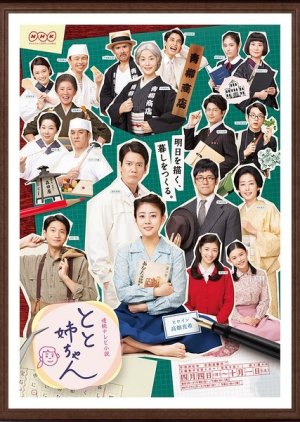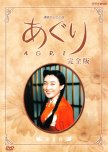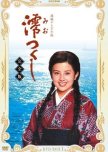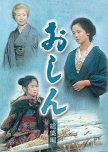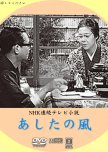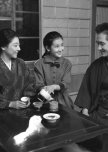
I’ve thought about what makes an asadora like Toto Nee-chan so strong compared to some others, and it’s easy to see what it is: A CLEAR ADHERENCE TO A SINGULAR STORYLINE. From its very first scene (where you see the main characters already grown and succesful as magazine publishers), the stage is set: you are going to hear a tale of a family of three sisters who strive through wars and hardships to one day become publishing giants, and the asadora never wavered. Every arc and challenge the family met became a stone in the foundation of what they would become and what their fortunes and fates would be. From Tsuneko going to school as a child, all the way to success, you follow her through every step of her life, crying and cheering along the way with her.
Usually a show’s best parts are in the first half of the drama and there is some faltering at the second half, but Toto Nee-chan kept you interested with each new development, and I remember being at week 20 and STILL feeling as excited as I was in its first few chapters! And by the time of the show’s last great arc, I couldn’t stop watching, burning through the episodes to see what happened next, I was SO INVESTED and had to force myself to slow down! SUCH a great STORY!
Watching Tsuneko grow up and rise to the challenges to create her dreams in both work and family was a joy to watch and you felt sadness with every tragedy that befell her and warmth in your heart every time she successfully completed her one of her dream goals.
In asadoras, they tended to show the heroine’s entire life, from beginning, middle, and (sometimes) all the way to the end...in that same way, I’m impressed at how well Toto Nee-chan gives you the sense of time moving. People growing up, moving away, etc....
As each arc ends and the children grow older, you really feel like you’re witnessing a whole life’s work. In the latter chapters with the sisters running the publishing house, thinking back on the early episodes where she and her sisters were still living with Grandmother Takiko in Tokyo, it seemed a million years ago, it seemed like a completely different drama! It truly gave you the feeling of history, like those were the "olden days"...
I began watching this because of my love for Mitsuki Takahata, and I’m so glad I did, this asadora has been a tour-de-force for her and has absolutely become my favorite Mitsuki Takahata role and drama! Since picking up Toto Nee-chan, I’ve put her latest show “Muchaburi” on hold so as to not distract from immersing in the asadora, but now it’s done I can finally go back and catch up. Hope it measures up, because Toto Nee-chan has become the Mitsuki Takahata drama ALL others must compare to!
Esta resenha foi útil para você?
A life's worth of tears and laughter
This is my first review. I hadn't planned on writing one, but I couldn't help it, as I realized - somehow astonishingly - no one had done it to this day.I'm not too partial to Asadoras - Ama-chan is the only other one I've seen yet - as I usually think that the dilution of drama and narrative tension over a great number of episodes does a disservice to the overall quality of the work. Yet, amazingly, Toto nee-chan manages to deliver under every aspect.
The story stays compelling from beginning to end, spanning 50 + years of Japan history, as the main characters find and solve new challenges in their daily life, weaving for themselves a path that never feels forced or out of tune. Indeed every choice, every decision, every plot twist (the lone exception in my view being the one in ep. 135) flows naturally from the disposition and nature of Tsuneko and the others , and their responses to the challenges that society and environment pose them.
Heavy subjects like war and its effects on common people, or the condition of working women in contemporary Japan are tackled brilliantly in simple yet not simplistic or moralistic ways.
Amid all this, there's Love and Friendship and Respect and Dignity and Pride; there's also Loss and Pain, but they never come out of nowhere, there's always a meaning and sadness comes through as part of something greater and beautiful.
Japanese artwork in its finer moments has a way of telling you a lot without saying a lot. They understand the spaces between people and the spaces between words, and it never fails to amaze me.
The cast is great. All members of the Kohashi family shine a little bit differently, each part contributing to the whole picture, and the chemistry between Hanayama-san and Tsuneko is the motor of the drama: the two push and complement each other perfectly, resulting in countless exhilarating and moving scenes as they embark in their business journey.
I came upon this drama because of Takahata Mitsuki, that I regard as one of the most promising young actresses in Japan, and I was not disappointed: her impersonation of Tsuneko will be unforgettable - Takahata here has a way of keeping the viewer always on the verge of a deep emotion, without necessarily recurring to tears or exaggerated mimics to do so. The always caring, prideful, brimming with passion Takahata/Toto nee, sometimes reminded me of the acting magic that Mitsushima Hikari so often rewards the viewer with.
Long story short: every drama that leaves you a train wreck of emotions and feelings begging to find their way out, is a drama worth watching. And this is one of those.
Esta resenha foi útil para você?

Esta resenha pode conter spoilers
"In the beginning, women were the sun..."
"Toto Nee-chan" is my 18th asadora [I can't believe I'm so close to watching twenty of these dramas lol.] and it quickly became one of my favorites that I've watched thus far. Takahata Mitsuki truly left a deep impression on me with her role as the heroine, Tsuneko. I really liked her in "Gochisosan" before but she really knocks it out of the park with this one. Her smile lights up the room and her subtle line deliveries tell you exactly how Tsuneko is feeling. I was impressed with Mitsuki's acting and how well the writer understood the character that they were writing.Nishijima Hidetoshi plays Tsuneko's father and, despite only appearing in about six episodes, makes yet another unforgettable impression. Before dying of tuberculosis, he asks Tsuneko to take his place in the family. She agrees and thus becomes "Toto Nee-chan." I appreciate that the finale, in which appears via a dream, addresses what a heavy burden this is. However, I also understand why he would ask this of her, considering the patriarchal society at the time. Thankfully, the unhealthy part of only lasts until Tsuneko's younger sisters are grown up. She then realizes that the entire family can support each other while she can still be the "head of the family" technically. At the end of the day, despite being a heavy burden, I think the promise gave Tsuneko a true purpose in life.
Tsuneko's sisters are Mariko (Sagara Itsuki) and Yoshiko (Sugisaki Hana & Irei Himena). These two are given strong characterizations and feel like co-leads with Mitsuki most of the time. Their mother is played by Kimura Tae. Another strong performance. I especially liked his storyline with her estranged mother Takiko (Daichi Mao). Unfortunately, by the end of the asadora, Tsuneko's sisters and mother feel somewhat pushed by the wayside. This is understandable since their storylines were mostly finished, though just a bit disappointing.
Besides Tsuneko, I think the second most memorable character is Hanayama-san (Karasawa Toshiaki). [I first saw Karasawa in the 1988 asadora "Jun-chan no Ouenka" and his acting skill has become so good since.] Tsuneko first meets Hanayama briefly before the war. They meet again and he agrees to become the chief editor of the magazine she's starting with her sisters. Hanayama seems like one of those typical mentor characters in asadoras. However, I feel their relationship goes deeper than that. To me, Tsuneko and Hanayama are a good example of how "soulmates" don't have to be romantic partners. I also enjoyed Hanayama's uncompromising nature, which is a good foil to Tsuneko who initially wants to please everyone.
To address the elephant in the room, Tsuneko doesn't get married or have children. She does technically have a love interest, Hoshino-san (Sakaguchi Kentaro). [He was also amazing in "Okaeri Mone."] He proposes her just before the war, but she turns him down to stay with her family. They meet again fifteen years later and seemingly have another chance. However, the timing isn't right and Hoshino makes the best decision for his children. Their romance is very pure and heartbreaking. I would have loved for their relationship to have worked out, but I find it realistic and I respect the decision to have an asadora heroine not get married for once.
I also loved the music for "Toto Nee-chan," particularly the theme song "Hanataba o Kimi ni" by Hikaru Utada. Her songs for dramas always seem to capture the essence of the series. I could listen to this song for hours and I never got tired of it once.
To close out this review: I absolutely loved this asadora. The writing was superb from start to finish with an endless amount of impressive characters and moments. The writer did such a good job closing out the drama with the last few weeks. The finale was also one of the best I've seen from an asadora so far. It was infinitely satisfying and I know I'll go back to watch it again very soon. An A+ asadora that I would recommend to everyone.
Esta resenha foi útil para você?

